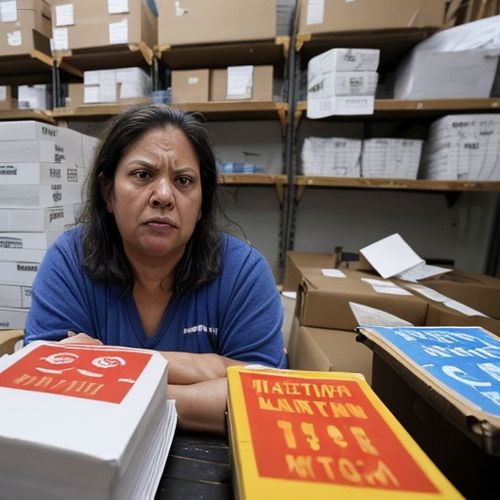In the ever-evolving landscape of social media, TikTok has emerged as a platform where generations converge to share experiences and advice. Millennials, who came of age during the Great Recession, are now using this platform to impart their hard-earned wisdom to Gen Z, who are facing the possibility of their first major recession as adults. This intergenerational exchange is not just about financial tips; it's about navigating the uncertainties of an unpredictable economic climate.
The Millennials' Journey
Millennials have had a tumultuous ride. Many were young adults when the Great Recession hit, and they have since faced challenges such as struggling to buy homes and pay off student debt. This generation has experienced economic hardships that have shaped their financial habits and outlook. Now, as they share their experiences on TikTok, they are helping Gen Z prepare for what could be another challenging economic period.
Sasha Whitney, a 37-year-old TikTok user, noticed a stark difference between the attitudes of Gen Z and her own experiences during the Great Recession. "Gen Z users shared the same feelings over an impending recession: downtrodden, frustrated, very bleak and hopeless about the future," she observed. This contrasts with her experience in 2009, when social media was less pervasive and the message of hope was more prevalent, thanks to Barack Obama's presidency.
The Current Economic Climate
The current economic climate is fraught with uncertainty. President Donald Trump's policy changes, particularly in the realm of trade, have led to warnings from experts like Fed Chair Jerome Powell and analysts at Goldman Sachs. JPMorgan has suggested that the ongoing trade war could lead to a recession in the US and globally. This comes at a time when young people, especially those in their early 20s, are already struggling with lower earnings, higher debt, and the lingering effects of the Covid-19 pandemic.
The Role of TikTok
TikTok has become a unique space where millennials and Gen Z can connect and share advice. Millennials like Whitney are posting videos with recession tips and no-buy lists to help ease the minds of younger viewers. These tips include practical advice like taking any job available, living below one's means, and deleting payment platforms like Klarna and After Pay. Other videos offer guides on building emergency savings funds and keeping resumes updated.
Imani Smith, a 29-year-old in Dallas, is one of many Gen Z users taking this advice to heart. She is limiting her spending by sharing subscriptions with friends, cutting back on dining out, and opting for cheaper beauty solutions like press-on nails from Amazon. "I want to (save) and build a practice of doing it before I have to do it out of basic necessity," Smith said.
The Psychological Impact
The anxiety and uncertainty felt by Gen Z are palpable. Many are worried about the job market and the cost of living. Smith noted that while older generations might have had an easier time weathering economic downturns, the current situation is different. "The cost of living was so low back then that they could have picked up something retail and held themselves afloat for a while," she said, emphasizing her concerns about the current economic landscape.
The Covid-19 pandemic has also played a significant role in shaping the mindset of young people. Smith, who started her first corporate job just before the pandemic hit, described the experience as a wake-up call. "It put me in the mindset that I need to be prepared for anything," she said. "Because none of us could have anticipated Covid-19 and the lasting effects that had."
The Broader Economic Landscape
The broader economic landscape is complex and multifaceted. While the US may not currently be in a recession, the signs of economic strain are evident. Millennials, who have lived through previous recessions, are using their experiences to guide younger generations. Their advice is not just about financial survival but about building resilience and adaptability in the face of uncertainty.
Simon Blanchard, a professor at Georgetown University’s McDonough School of Business, emphasized the importance of self-reflection during economic downturns. "It may be a good time to self-reflect if you have enough emergency savings, whether we’re in a recession or not," he said. He noted that people often cut entire categories of spending rather than reducing spending across the board, which can help maintain a sense of normalcy in other areas of life.
The intergenerational exchange on TikTok highlights the shared experiences and collective wisdom of millennials and Gen Z. As young people navigate the uncertainties of the current economic climate, the advice and experiences shared by millennials offer valuable insights. From practical financial tips to emotional support, TikTok has become a platform where generations come together to prepare for the challenges ahead.
In a world marked by economic uncertainty and rapid change, the ability to learn from the past and adapt to the present is crucial. Millennials, who have weathered their share of economic storms, are now guiding the next generation through the potential challenges of a recession. Their advice, rooted in personal experience and resilience, offers a beacon of hope and practicality for Gen Z as they prepare for the future.

By Eric Ward/Apr 29, 2025

By Jessica Lee/Apr 29, 2025

By Lily Simpson/Apr 29, 2025

By Amanda Phillips/Apr 29, 2025

By James Moore/Apr 29, 2025

By Amanda Phillips/Apr 29, 2025

By Sophia Lewis/Apr 29, 2025

By Ryan Martin/Apr 29, 2025

By Elizabeth Taylor/Apr 29, 2025

By Noah Bell/Apr 29, 2025

By Emily Johnson/Apr 29, 2025

By Grace Cox/Apr 29, 2025

By Rebecca Stewart/Apr 29, 2025

By Elizabeth Taylor/Apr 29, 2025

By Michael Brown/Apr 29, 2025

By Olivia Reed/Apr 29, 2025

By Daniel Scott/Apr 29, 2025

By Joshua Howard/Apr 29, 2025

By Megan Clark/Apr 29, 2025

By John Smith/Apr 29, 2025